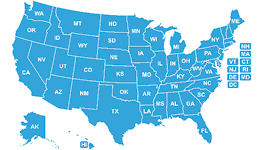Employer’s guide to workers' compensation claims
It’s important to educate your employees about workplace injury reporting procedures and to train your supervisors on how to report incidents to our claims department. Download our flier in English or Spanish.
- Report all workplace injuries or illnesses immediately, even if you think the injury does not require medical treatment. If you’re unsure about the injury, our Nurse Triage Hotline can help advise you on the best course of treatment and get the paperwork started.
- Document any information you receive from the injured employee, such as a written statement, medical treatment provider, contact information and wage information.
- Be sure to photograph and/or secure any object that caused the injury (if applicable).
- Document accident scene information and obtain witness statements immediately.
- Keep in touch with the injured worker to ensure they are being cared for and supported through their return.
Our Nurse Triage Program is available 24/7 to help supervisors connect employees with non-life-threatening injuries to the right care as quickly as possible.
Learn more about the Nurse Triage hotline.
Our workers’ comp virtual toolkit contains everything needed to manage state specific workers’ compensation requirements.
Nationwide® helps many leading companies implement our return-to-work program to help injured employees get back to meaningful work as soon as it’s medically possible.
Learn more about all the benefits of our Successful Return-to-Work Programs for Commercial and Ag.
The First Fill program (English/Spanish) provides one-time prescription processing before the Workers’ Compensation (WC) claim is established. This prevents an out-of-pocket prescription expense for the injured worker. This program allows the injured employee to fill a prescription written by their treating physician for medications related to their reported workers’ compensation injury. They present the temporary prescription card at the pharmacy at the time the prescription is filled. This is only a temporary prescription card; they may receive a permanent drug card in the future based on the merits of the claim. Download a temporary ID card form (English/Spanish).
Reporting a claim
Report within 24 hours (even if you don’t have all the information)
Claims-reporting options
Don’t wait. Report workplace accidents or injuries the moment you become aware of them. There is no need to wait for complete information. Reporting claims early / Reporting Farm & Agribusiness claims early helps reduce claims costs and ensure successful return-to-work scenarios.
We offer many convenient ways to file a workers’ compensation claim.
- Contact the Nurse Triage Hotline at 1-855-777-7090.
- If you have a username and password, you can log in to your Commercial or Agribusiness account to file a claim. No username and password? No problem. You can register here for Commercial or email us for Agribusiness access.
Additional ways to report a Commercial claim:
- Email us and attach a loss reporting form and any additional documents.
- Call us at 1-800-421-3535 anytime.
- Fax a loss-reporting form and any additional documents to 1-800-554-2899.
You’ll need:
- Contact information for you and others involved
- Your policy information (if available)
- The date of the incident
- A description of the injury
If you need additional help, contact your agent. Find a Commercial agent or email us to find an Agribusiness agent.
Once you submit a claim, Nationwide support includes:
- A network of doctors, hospitals and other medical providers to provide quicker access to care1
- Case management nurses to help severely injured workers obtain prompt treatment
- Pharmacy, physical therapy and diagnostic partners focused on quality care, medical cost control, timely service and ease of use
- Our Successful Return-to-Work Program to help employees transition back to work with care and empathy
[1] Note that while employers can recommend certain providers to employees, some state laws prohibit employers from requiring that they use those providers.
Additional information about workers’ comp claims? Start here.
Nationwide knows workers’ comp
Explore our programs further.
For small, midsize and growing companies
With specialized services and resources for unique markets
For farm, ranch and commercial agribusiness operations
